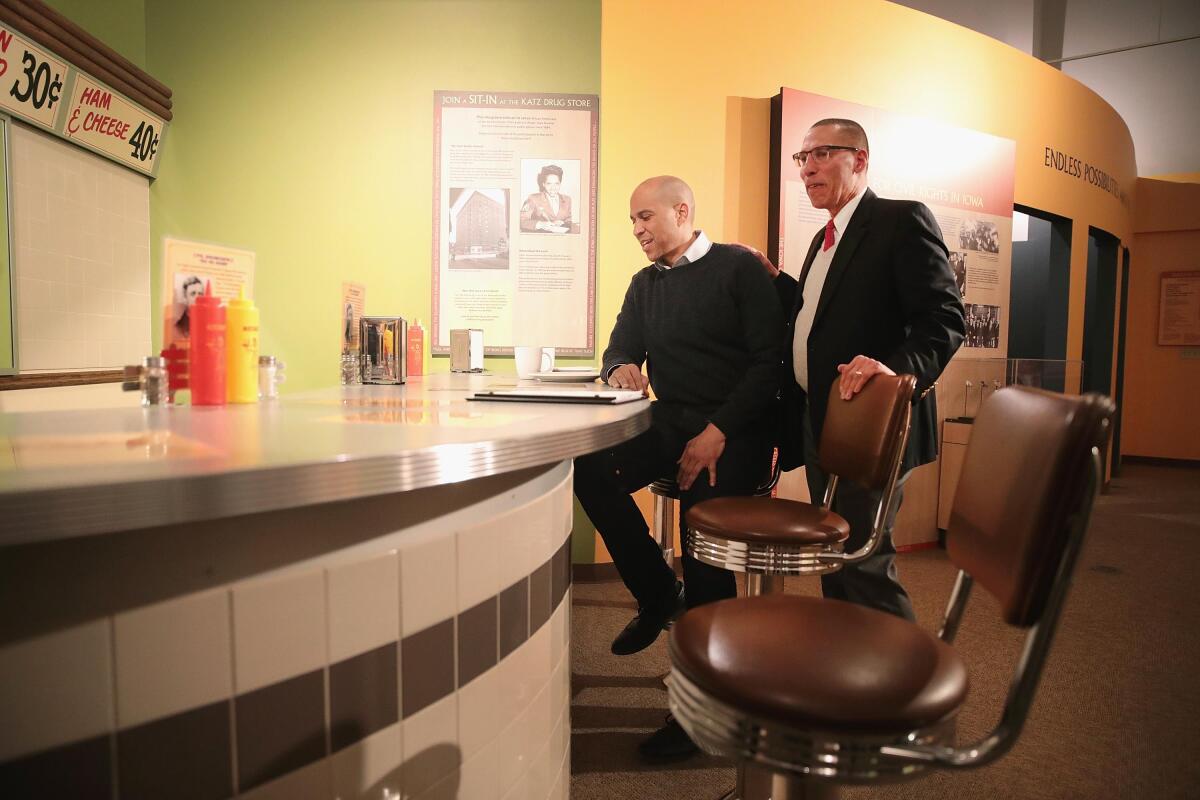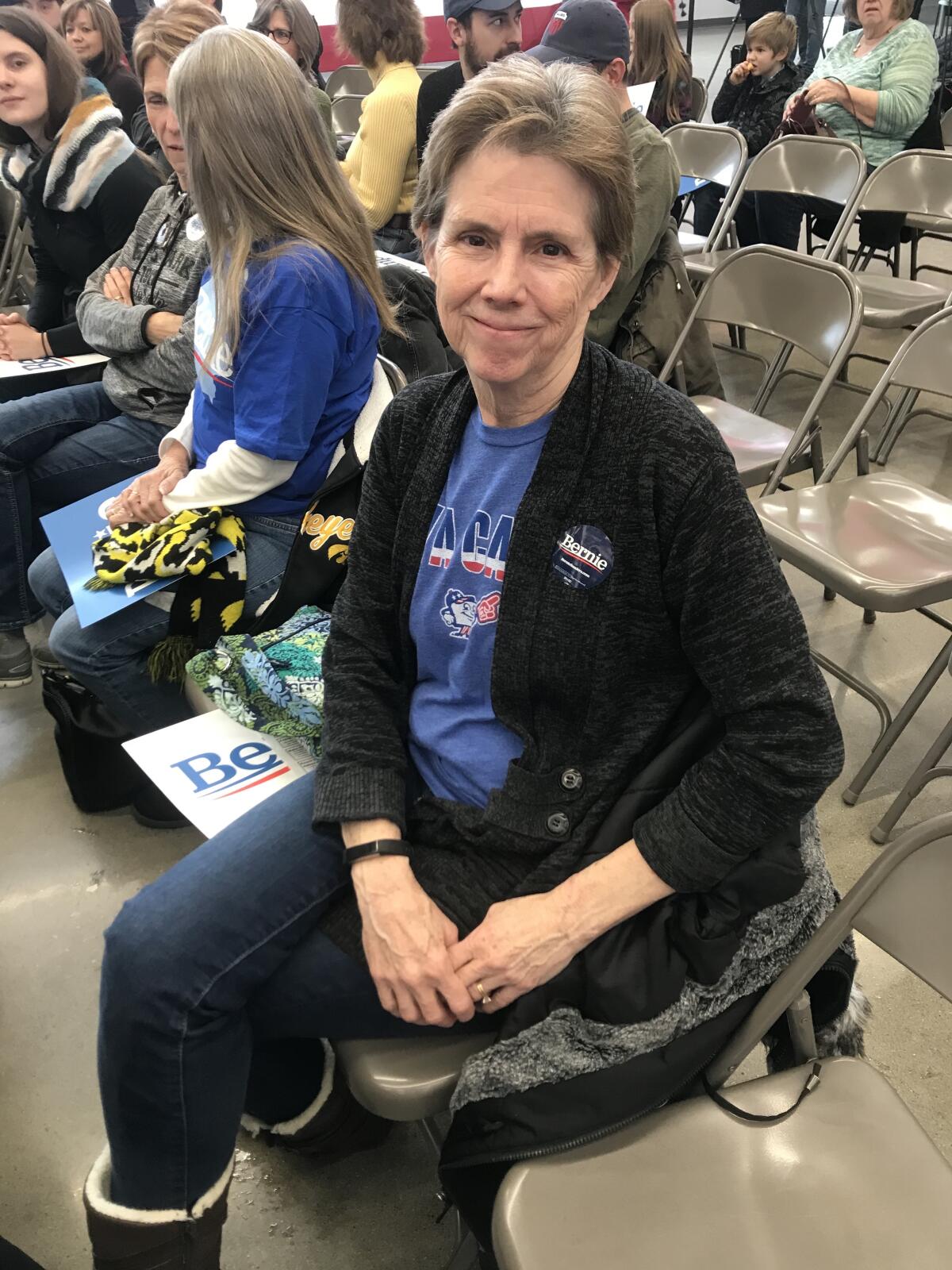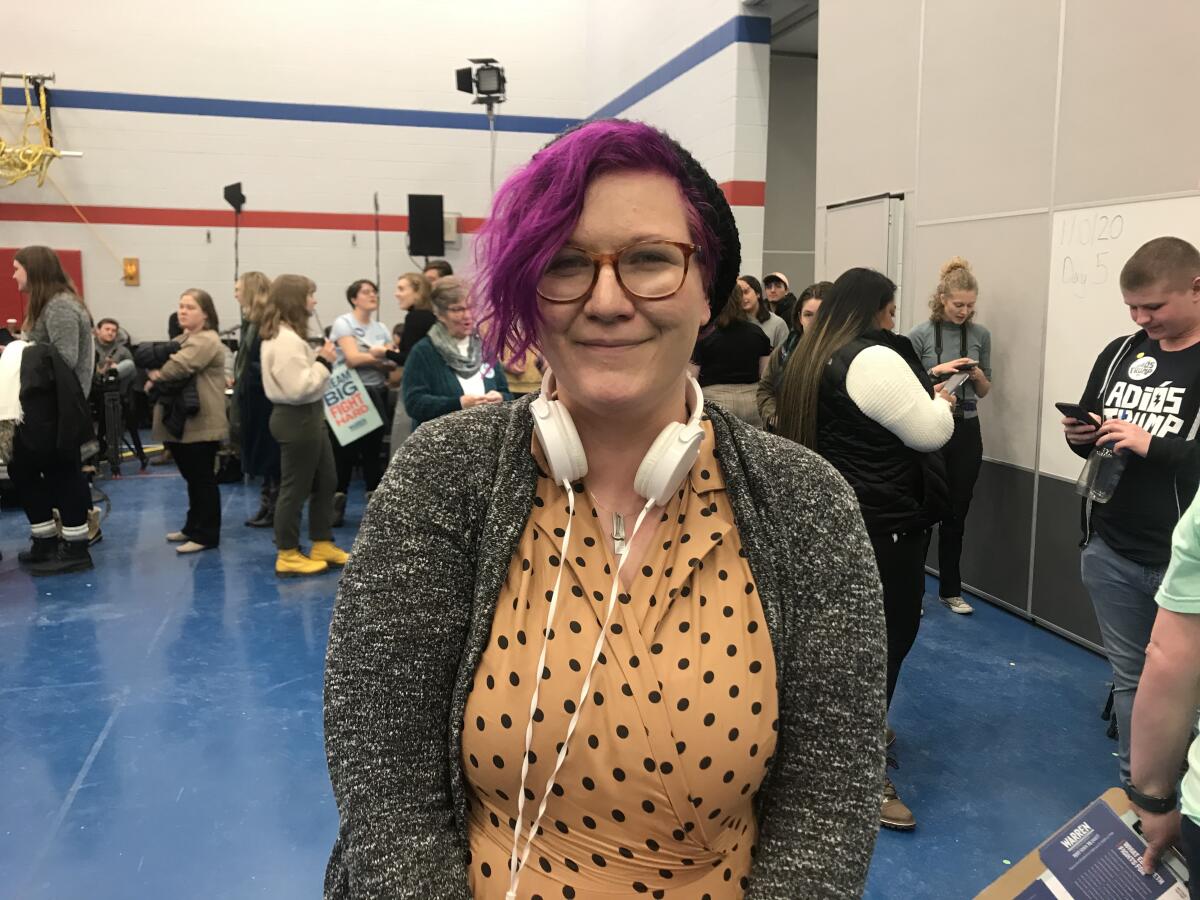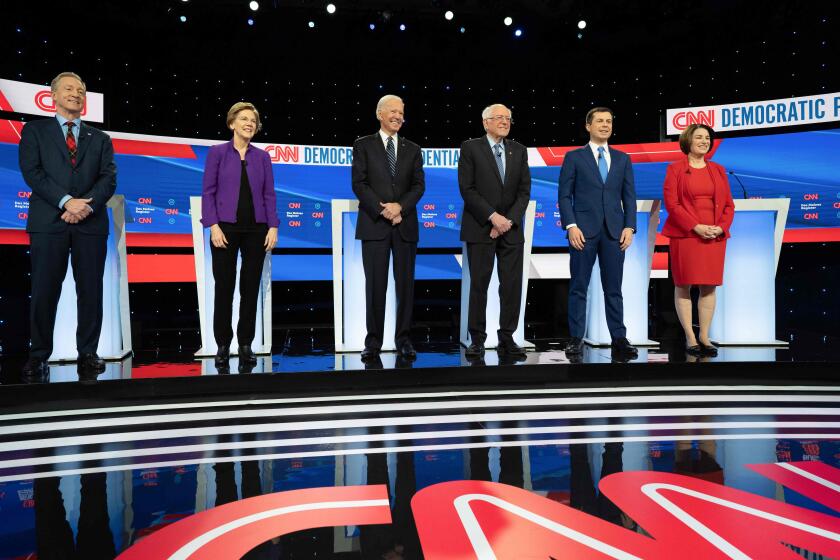Many Iowa Democrats, desperate to pick a candidate to beat Trump, are undecided and under pressure

- Share via
CEDAR RAPIDS, Iowa — Dale Todd didn’t plan on being an undecided voter three weeks out from the pivotal Iowa caucuses.
“I’m not one to kick the tires in a car,” said Todd, a Cedar Rapids City Council member. “When I go to a car lot, I buy what I like and I don’t mess around.”
So he committed early to New Jersey Sen. Cory Booker, just as he had committed early in the 2008 cycle to Barack Obama, and to Hillary Clinton eight years later.
But after Booker dropped out of the race this week, Todd found himself among the majority of Iowans who have not firmly made up their minds on the first nominating contest of the Democratic presidential primary. The presidential campaign season kicked off here more than a year ago, but the sprawling field and a near-paralyzing desire to beat President Trump has left Hawkeye State residents feeling more unsettled than in past elections.
Recent polls point to an unpredictable contest, with little consensus on the likely victor. One survey last week from the Des Moines Register and CNN showed Vermont Sen. Bernie Sanders atop a tightly clustered pack of contenders, while a Monmouth University poll showed former Vice President Joe Biden out front. Both polls found agreement on one data point: About 60% of Iowa voters say they may change their minds between now and the Feb. 3 caucuses.
Candidates at the January Democratic debate cover foreign policy, healthcare and climate, and enter charged territory over gender in politics.
“The caucuses are notoriously sort of late-breaking campaigns, so the fact there are still upwards of 60% of voters who say they could change their mind just means the work that goes into identifying voters’ first choices, second choices, third choices in a really fluid and changing field is more important than ever,” said David Kochel, a veteran Iowa GOP operative.
After months of the soft sell, the candidates and their supporters have become notably blunter in their appeals.
“I ask that you support me,” Minnesota Sen. Amy Klobuchar said to Iowans at an art museum in Waterloo this month. “I know I’m not in the lead right now, but I’m doing really well. I’m asking you to sign one of those commit-to-caucus cards. It’s the beginning of the year. Just go out and do it!”
It’s not that voters like Jessalyn Holdcraft are commitment-phobic. Holdcraft, who works in marketing for a nonprofit in Cedar Rapids, was on board with Clinton’s campaign in May 2015, some nine months before caucus night.
“This time was so different,” Holdcraft, 27, said in a Cedar Rapids loft where Rep. Katie Porter of Irvine had just made a pitch for Massachusetts Sen. Elizabeth Warren. “I didn’t have that same loyalty to a campaign. I came in with an open mind.”
And she came in with a plan — a spreadsheet where she ranked the candidates on various criteria, including their positions, their ability to inspire, the quality of their campaign organizers. She crunched the numbers and found that California Sen. Kamala Harris was her best match; Holdcraft settled on committing the week that Harris dropped out of the race.
Now Warren ranks top on her spreadsheet, but Holdcraft hasn’t made a final decision.
“I’ll probably sign a ‘commit to caucus [card]’ before Feb. 3,” she said. “When that is, I don’t know.”

Some Iowa voters say it’s necessary to keep an open mind, given that breaking news can jolt the dynamics of the race. The heightened tensions between the United States and Iran, for example, led to a prolonged discussion of foreign policy in Tuesday’s debate in Des Moines.
Again and again, Iowans point to the same reasons for their slow decision-making: too many choices to sort through and the terror of making the wrong pick.
Jim Estin has spent months following the candidates — he’s seen Pete Buttigieg, the former mayor of South Bend, Ind., four separate times — but he still hasn’t been able to pick a favorite.
“I have dated them all,” the 65-year-old psychiatric social worker said. He made the admission sheepishly, as friends and colleagues milled around his Iowa City living room in the closing minutes of a breakfast gathering put on by the Warren campaign. His wife, Ann, a law professor, sided with the senator last fall.
But Estin has regretted some of his past choices, such as supporting former North Carolina Sen. John Edwards in the 2008 caucus over Obama, the eventual winner. The shock of Trump winning in 2016 has made him second-guess his instincts even more.
“Democrats really missed something important in the last election,” he said. “I feel a little traumatized.”
The dilemma voters face can be described most simply as the tug of war between the heart and the head, said Dennis Goldford, a political science professor at Drake University in Des Moines.
The former, he said, “you think is a wonderful candidate; you’d go to the mat for that candidate. It’s the person that makes your heart beat faster,” he said. The head, meanwhile, is “if you look at it coldly, objectively — who would seem to have the best chance of defeating the opposition?”
With no clear candidate checking all those boxes, Goldford said, a large number of voters remain undecided.
“They desperately want to defeat the president and they desperately want to avoid blowing the opportunity to do so,” he said. “So they’re very, very skittish about whose side they should come down on.”
Mary Newton said her decision was weighing heavily on her; being uncommitted this late in the calendar is an aberration, she added.
“I always know, but we’ve never had this many choices,” she said. “You know, usually it’s been two or three. So, it’s very difficult. They would all be great.”
The 63-year-old retired teacher from Newton has been inundated with text messages and emails from campaigns.
“I feel pressure,” she said. “I feel I need to do the right thing.”
Newton said she will likely go into her caucus actively considering at least two contenders — and she likely won’t be alone. Barbara Trish, a professor of political science at Grinnell College, said some voters may firm up their choice in the coming weeks.
“But I suspect that a significant proportion of the caucus electorate will show up ... potentially falling into any number of camps,” she said.

Lindsey Ellickson, 31, was still shopping for a candidate on Sunday, when she attended the Marshalltown rally with Warren and Julián Castro, who had recently dropped out of the race and endorsed the senator. Ellickson, a Cedar Rapids resident and an advocate for the homeless, was torn between Warren and Booker.
The next day, Booker dropped out, and Ellickson’s choice was down to one.
“I wish it was a decision I could’ve made on my own without him exiting the race,” she said.
Thirty minutes into Tuesday’s debate, she made her decision official, announcing on Twitter: “I’m caucusing for @ewarren.”
For Todd, Booker’s departure meant new uncertainty in the race. Within an hour of the news breaking, Todd, the first African American to serve on the Cedar Rapids City Council, had heard from the Biden campaign. Entrepreneur Andrew Yang’s campaign also checked in.
“I’m an official free agent,” Todd said, “I’ve still got my Cory sign, but my options are open.”
Mason reported from Cedar Rapids and Mehta from Marshalltown, Iowa.
More to Read
Get the L.A. Times Politics newsletter
Deeply reported insights into legislation, politics and policy from Sacramento, Washington and beyond. In your inbox twice per week.
You may occasionally receive promotional content from the Los Angeles Times.













